- Music Information Activities
- News
- Current weekly Newsletter (in Greek)
- Newsletters Archive (in Greek)
The Ionian islands – Ionian School of Music, 1771–1900
The Ionian Islands were successively under Venetian (1386–1797), French (1797–1814) and British (1814–64) rule before their union with Greece. Influences from the neighboring Italy helped the Islands develop Western Art Music before the Greek Liberation and thus constitute the future cradle of Western Art Music in Greece. Although the first opera was presented in 1733 at the Tearto San Giacomo in Corfu, the first performances leading to the development of a music tradition that extended over Zakynthos, Kefallonia, Lefkada appeared in 1771 and in mainland Greece after 1830. Consequently, the year 1771 should be considered as the year marking the beginning of western art music in Greece.
Teatro di San Giacomo
In 1720, the former British officer’s club is turned into a theatre, the Teatro di San Giacomo [http://w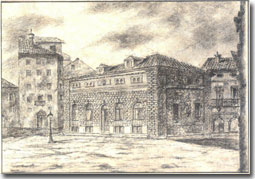 www.corfu.gr/Hellas/politism/sangiac.htm ], where theatrical performances and operas are performed under contracts between the municipal authorities and itinerant companies. In the memoirs of the famous Giacomo Casanova, we find that he had also been the impresario there in 1945. Between 1771 and 1798, 45 operas were staged at the Teatro di San Giacomo, mostly opere buffe of the Neapolitan school. The first known stage work by a Greek composer, Stephanos Poyagos's Gliamanti confusi, was given at the S. Giacomo in 1791. Another work by Poyagos, “I para Faeaxin afixis tou Odysseos” (‘Ulysses' Arrival (on the island) of the Phaeacians’), was staged in 1819; both works are lost. The earliest extant manuscripts of Ionian music, including Nicolaos Mantzaros' sole opera “Don Crepuscolo” and a number of arias and cantatas, date from 1815. Works of Mantzaros “akin” to operas were performed in Corfu and Lefkada on festive occasions in 1832 and 1833. In 1929, he composed the musical setting for Dionysios Solomos’ poem “Hymnos eis tin Eleftheria” (Hymn to Liberty), which was adopted in 1865 as the Greek National Anthem. The Ionian Islands exhibit a considerable amount of operatic composition in the 19th and early 20th centuries, including
www.corfu.gr/Hellas/politism/sangiac.htm ], where theatrical performances and operas are performed under contracts between the municipal authorities and itinerant companies. In the memoirs of the famous Giacomo Casanova, we find that he had also been the impresario there in 1945. Between 1771 and 1798, 45 operas were staged at the Teatro di San Giacomo, mostly opere buffe of the Neapolitan school. The first known stage work by a Greek composer, Stephanos Poyagos's Gliamanti confusi, was given at the S. Giacomo in 1791. Another work by Poyagos, “I para Faeaxin afixis tou Odysseos” (‘Ulysses' Arrival (on the island) of the Phaeacians’), was staged in 1819; both works are lost. The earliest extant manuscripts of Ionian music, including Nicolaos Mantzaros' sole opera “Don Crepuscolo” and a number of arias and cantatas, date from 1815. Works of Mantzaros “akin” to operas were performed in Corfu and Lefkada on festive occasions in 1832 and 1833. In 1929, he composed the musical setting for Dionysios Solomos’ poem “Hymnos eis tin Eleftheria” (Hymn to Liberty), which was adopted in 1865 as the Greek National Anthem. The Ionian Islands exhibit a considerable amount of operatic composition in the 19th and early 20th centuries, including 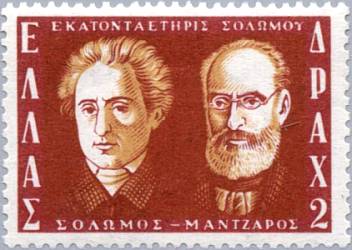 works by S. Xyndas, Edouardos Lambelet, D. Padovanis (or Padova), P. Carrer, Frangiskos Domeneginis (1809–74), Dionyssios Rhodhotheatos (1849–92) and others.
works by S. Xyndas, Edouardos Lambelet, D. Padovanis (or Padova), P. Carrer, Frangiskos Domeneginis (1809–74), Dionyssios Rhodhotheatos (1849–92) and others. 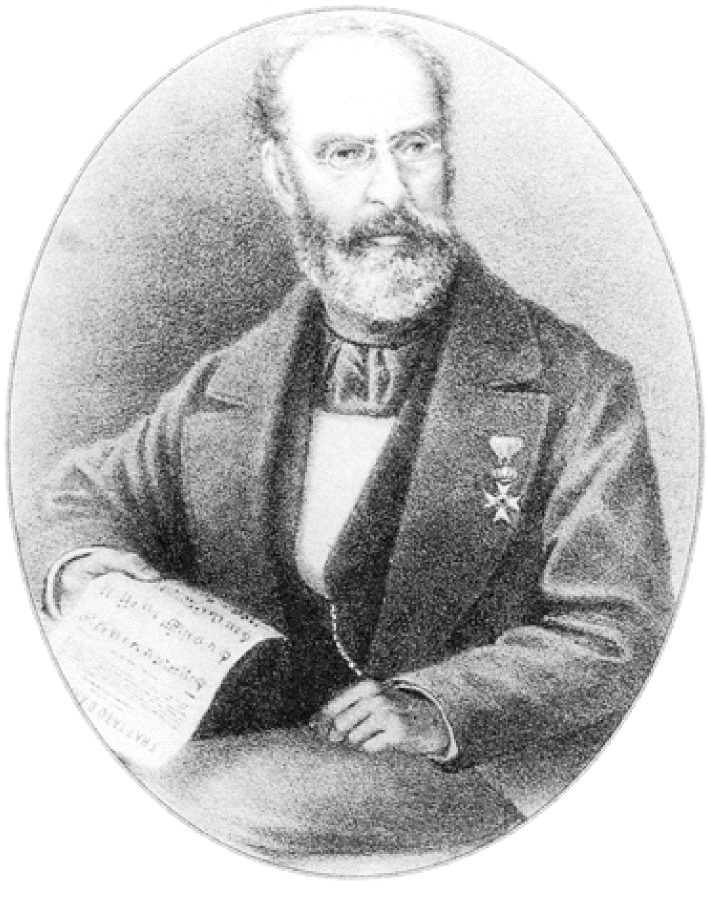
In 1893, the Municipal Theatre of Corfu is built in the style of the Scala di Milano. 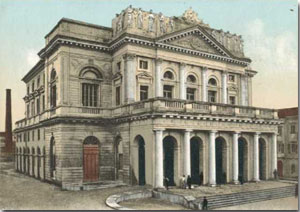
Deplorably, most of the earlier Ionian composers' operas were either dispersed or were lost due to bombings (Municipal Theatre of Corfu, 1943) or to the earthquakes in the Ionian Islands in 1953. The stylistic models for the Ionian School were initially Italian, from Zingarelli and Mercadante to Bellini, Donizetti and Verdi. Several of their operas were inspired not by topics from antiquity but by historical facts and figures from the more recent past, especially the 1821 War of Independence; Italian composers, often resident, including G.B. Ferrari (Gli ultimi giorni di Suli, 1859–60) and Rafael Parisini (Arkadion, inspired by the Cretan uprising of 1866–7), also drew on such material. Among the few surviving Ionian operas from this period are, 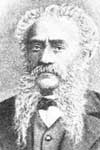 besides that of Mantzaros, “Dizce” by Padovanis, “O ypopsifios vouleftis” (‘The Parliamentary Candidate’, 1867, the first opera to a Greek text) by Xyndas, eight operas by Carrer, most of the output of Samaras, whose operas were widely recognized internationally, the operas of Lavrangas, who did much to promote the cause of opera in the country and whose “Ta dyo adelfia” (‘The Two Brothers’, 1901) can be regarded as the first National School opera, Iossif Mastrekinis' recently discovered “Eleazaros” (1898, a biblical opera in an early Verdian style); and Sakellaridis' opera “Perouze” (1911), which may be seen as an intermediate step between the Ionian group and the domineering figure of
besides that of Mantzaros, “Dizce” by Padovanis, “O ypopsifios vouleftis” (‘The Parliamentary Candidate’, 1867, the first opera to a Greek text) by Xyndas, eight operas by Carrer, most of the output of Samaras, whose operas were widely recognized internationally, the operas of Lavrangas, who did much to promote the cause of opera in the country and whose “Ta dyo adelfia” (‘The Two Brothers’, 1901) can be regarded as the first National School opera, Iossif Mastrekinis' recently discovered “Eleazaros” (1898, a biblical opera in an early Verdian style); and Sakellaridis' opera “Perouze” (1911), which may be seen as an intermediate step between the Ionian group and the domineering figure of 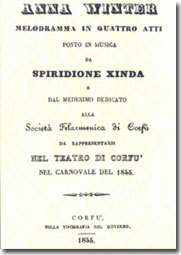 Manolis Kalomiris.
Manolis Kalomiris.
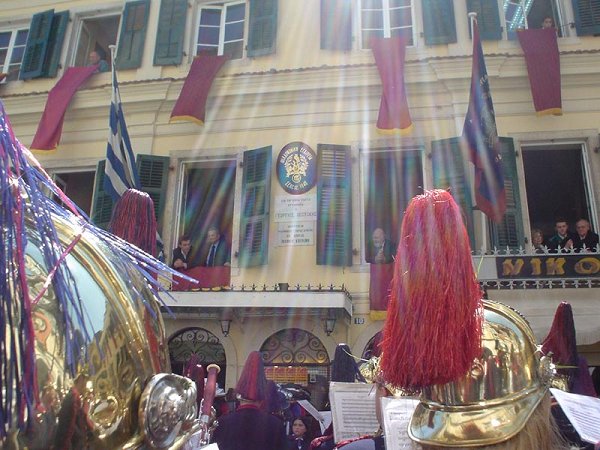
In 1839 the British authorities forbade the participation of their military bands in foreign religious ceremonies; this led the following year to the foundation of the Corfu Philharmonic Society , the 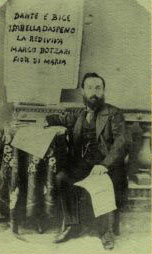 earliest Greek conservatory, whose main function was gradually reduced to the training of wind players. Mantzaros was elected its president for life. Wind bands soon spread to other Ionian islands and to mainland Greece.
earliest Greek conservatory, whose main function was gradually reduced to the training of wind players. Mantzaros was elected its president for life. Wind bands soon spread to other Ionian islands and to mainland Greece.
Some of the obstacles to the reception of Ionian composers in mainland Greece are recorded in Carrer's Memoirs: the indifference of royalty and politicians, and at times open hostility. In 1861, for instance, the future Archbishop of Athens tried, unsuccessfully, to sabotage the premiere of Carrer's opera “Markos Botsaris”.


 Hellenic
Hellenic  English
English